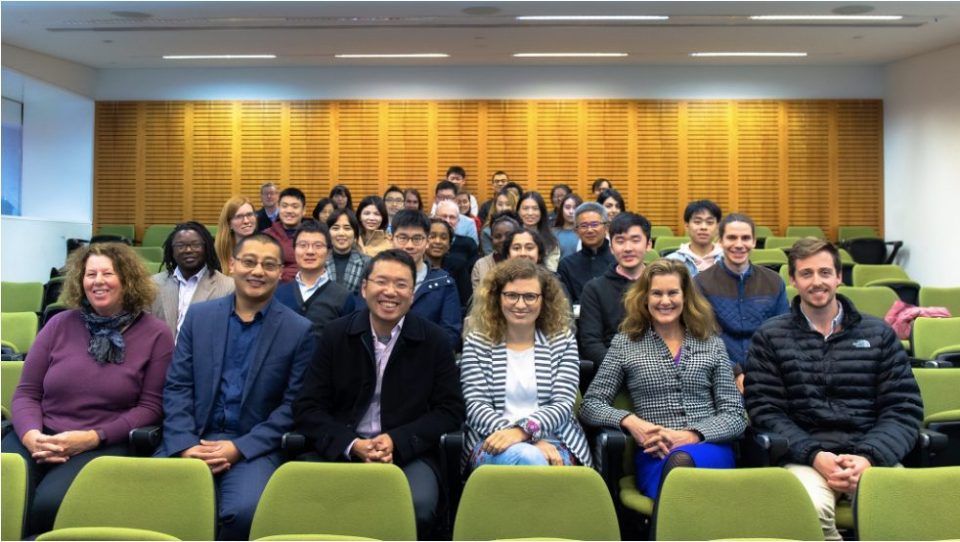
Insights from the UNSW Risk and Actuarial Industry Workshop
The UNSW School of Risk and Actuarial Studies hosted the UNSW Risk and Actuarial Industry Workshop on 6-7 December 2021. The online workshop attracted more than 110 registrants and brought together industry experts and leading academics to discuss current and emerging topics in risk, actuarial science, and data analytics.
The aim of the workshop was to create networks and opportunities for further collaboration between industry and academia in research, education, and social engagement opportunities. The workshop followed the 29th Colloquium in Pensions and Retirement Research on 1-3 December 2021, also co-hosted by the School of Risk and Actuarial Studies.

One and a half-day online workshop: presentations, discussion, Q&A and networking
The workshop consisted of four sessions and several virtual networking opportunities. Over 110 people registered, and 40-70 people attended each session. The sessions comprised short presentations from industry speakers and UNSW academics followed by Q&As, focusing on the following topics:
Session 1: Actuarial Analytics and Insurance
- Hugh Miller (Taylor Fry), Chris Dolman (IAG), Jon Shen (Suncorp), Roel Verbelen (Finity)
- Bernard Wong (UNSW), Fei Huang (UNSW), Andrés Villegas (UNSW)
- Moderator: JK Woo (UNSW)
Session 2: Retirement Planning
- Jacki Ellis (Aware Super), Aaron Minney (Challenger Financial Servies)
- Hazel Bateman (UNSW), Kevin Liu (UNSW), Yang Shen (UNSW)
- Moderator: Katja Hanewald (UNSW)
Session 3: Risk Modelling
- Abdal Chaudhry and Michael Leitschkis (Milliman London), Elaine Pang (AIG)
- Qihe Tang (UNSW), Han Li (Macquarie), Eric Cheung (UNSW), Katja Ignatieva (UNSW)
- Moderator: Jinxia Zhu (UNSW)
Session 4: Climate Risk
- Rade Musulin (Finity)
- Andrew Pitman (ARC Centre of Excellence for Climate Extremes, UNSW)
- Moderator: Elaine Collins (UNSW)
A perspective from the Actuaries Institute
In the workshop opening, Mike Callan, Executive General Manager, Education at the Actuaries Institute, talked about collaboration with universities, especially regarding educating future actuaries.
Mike mentioned that “It would be useful to have some sort of feedback/summary on various research initiatives completed by the Australian universities to the wider membership.”
He also pointed out that “Research between universities and industry is a two-way street- there are lots that can be learned from each other.”
The main takeaways
The workshop showcased several successful collaborations between UNSW and industry. For example, Fei Huang and Chris Dolman mentioned joint work they have published on insurance discrimination and pricing fairness. Hazel Bateman described her superannuation and retirement research with UniSuper, Cbus, Household Capital and Aware Super. Bernard Wong discussed aspects of AI/ML enhanced actuarial analytics, which arose out of a collaborative ARC Linkage Project with Allianz, IAG, and Suncorp. Kevin Liu and Fei Huang discussed ‘Sandbox’ education projects they have developed with Aware Super, the Conexus Institute, Super Consumers Australia (read more), and Suncorp.
The UNSW Sandbox education program is a pedagogical innovation that facilitates problem-based, experiential learning at scale by integrating industry challenges into course curricula as authentic assessments. Jacki Ellis commented on Aware Super’s very positive experience as a UNSW research partner, Co-op sponsor and Sandbox partner.
The different workshop sessions also generated ideas and discussions around new potential collaborations in teaching and research.
For example, Hugh Miller shared some of his work in ‘social sector analytics’, which helps government departments use their data better.
Roel Verbelen discussed analytical modelling strategies to assess risk at a granular level where the amount of exposure is limited. He advocated the use of the SMuRF package in R, developed by researchers at KU Leuven, which fit generalized linear models via regularized maximum likelihood to deal with multiple types of predictors using Lasso-type penalties.
Andrés Villegas described StMoMO package he developed with co-authors which implements generalised age-period-cohort stochastic mortality models. Aaron Minney gave examples of ongoing research collaborations and suggested several potential research topics for retirement research. Abdal Chaudhry and Michael Leitschkis introduced Least Squares Monte Carlo techniques and invited teaching and research collaborations.
The Climate Risk session provided important directions for future work in this area.
Rade Musulin spoke about how natural perils models can be adjusted for future climate risk and how actuaries should use the information from such models.
Rade also commented on the key skills actuaries need when doing climate risk work. Andrew Pitman summarised the evidence on temperature and rainfall changes over Australia. He also provided a snapshot of existing climate models and commented on the use of climate models in assessing business risk.
How to bridge industry and academia
Workshop participants discussed how academics could better communicate their research and connect with industry partners. Several industry speakers and Mike Callan suggested that it is important that academics share their research outcomes outside of academic circles, for example, at events and workshops organised by the Actuaries Institute and via Actuaries Digital. Firstlinks, COTA and the Connexus Institute were mentioned as potential facilitators for retirement research. UNSW academics regularly present at the All-Actuaries Summit, and we strongly recommend both the institute and actuarial departments to continue to facilitate this.
There was also an agreement among industry presenters that ‘fancier’, more complex models are often not helpful in practice and that academics should consider that practical challenges in model use.
We note that there can sometimes be misalignments of goals between academia and industry, where academic journals often expect theoretical development of complicated models as part of the long-term development of knowledge.
Nevertheless, most of the best academic research also has close links to society and industry, as recognised, for example, by the Australian Research Council’s Centre of Excellence and Linkage Grant schemes. Furthermore, Jacki Ellis recommended that for industry-focused research outputs, academics should focus on their results and key messages rather than describing detailed methodology.
Next steps
Building on the success of the ‘UNSW Risk and Actuarial Industry Workshop’, we plan to hold a second similar workshop in mid-2022. We will also build on the insights and new connections gained from the first workshop to develop new education and research initiatives involving UNSW academics, students and our industry partners.
Please contact us if you are interested in connecting with the UNSW School of Risk and Actuarial Studies.
CPD: Actuaries Institute Members can claim two CPD points for every hour of reading articles on Actuaries Digital.






